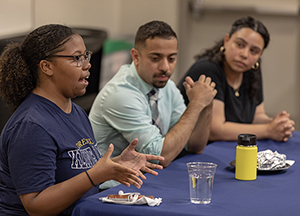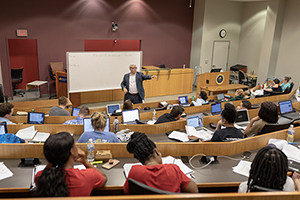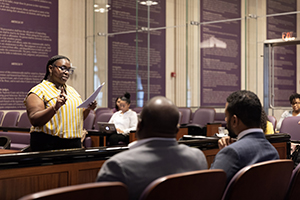For three weeks, nine undergraduates experienced a rigorous introduction to law school through the Kline School of Law’s inaugural DiveIN Immersion in Legal Education program.
Aimed at encouraging under-represented students to apply to law school, the program provided rigorous reading and coursework, insights on the law school admissions process, Q&A sessions with current students and alumni, networking opportunities with Philadelphia attorneys and even a chance to test their advocacy skills in a mock trial.
 All nine participants are currently enrolled at Lincoln University, although the program will invite students from numerous undergraduate programs in the future, said Danielle Boardley, director of admissions and diversity initiatives and architect of the program.
All nine participants are currently enrolled at Lincoln University, although the program will invite students from numerous undergraduate programs in the future, said Danielle Boardley, director of admissions and diversity initiatives and architect of the program.
Participants began each day with Law School 101, taught by Professor Coleman, who provided an overview of the realities of law school, gave and discussed reading assignments and administered sample exams. Abbie Heller, the assistant director of trial advocacy, taught participants the mechanics of direct and cross-examining witnesses and groomed them for a mock trial.
 The program also featured a lecture on the death penalty by Dean Daniel Filler, a sample Contracts class taught by Senior Associate Dean Kevin Oates, meetings with law school benefactor Tom Kline and U.S. District Court Judge Darnell Jones, as well as visits to Ballard Spahr and Reed Smith.
The program also featured a lecture on the death penalty by Dean Daniel Filler, a sample Contracts class taught by Senior Associate Dean Kevin Oates, meetings with law school benefactor Tom Kline and U.S. District Court Judge Darnell Jones, as well as visits to Ballard Spahr and Reed Smith.
Faculty, law school staff, current students and alumni led discussions on networking, diversity in the legal profession, access to justice, conducting research in a law library and strategies for completing an accelerated JD. A doctoral student from Drexel’s School of Education offered tools for strengthening reading comprehension.
In addition, each participant was referred to three mentors: a current student, a faculty member and a graduate who agreed to provide insights and support.
Participants said the program helped demystify law school and provided an invaluable resource for those without attorneys in the family who could offer advice to aspiring lawyers.
 “I was almost discouraging myself. I was literally thinking of a Plan B,” said Samone Brown, a rising junior from Baltimore. “This program made me feel comfortable. Everyone’s supporting us. It seems like they enjoy it. It seems like they want us to succeed.”
“I was almost discouraging myself. I was literally thinking of a Plan B,” said Samone Brown, a rising junior from Baltimore. “This program made me feel comfortable. Everyone’s supporting us. It seems like they enjoy it. It seems like they want us to succeed.”
The advice on resumé writing and networking was relevant for advancing professional goals in law or elsewhere, said Destiny Queen, a rising junior from Prince George’s County, Maryland.
“I knew law school involved a lot of reading, but I wasn’t expecting to read THIS much,” Queen said. “It places you in a position where you can feel prepared.”
By the time the program had concluded, Boardley said, the participants had forged connections with current students, alumni, law faculty, practicing attorneys and a judge—all who look like them.
"If they didn't know it before, they should now be certain that they, too, can be legal professionals," Boardley said, adding that the participants set an exceedingly high bar for future cohorts and proved the value of the program.
“They have impressed me every single day with how involved, engaged and inquisitive they are,” Boardley said. “Now that we have built this pipeline to help under-represented students navigate their way into law school, I can’t wait to see where it will lead.”